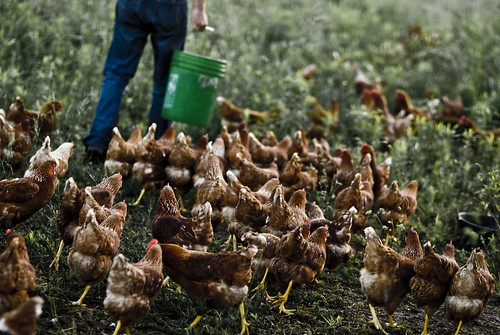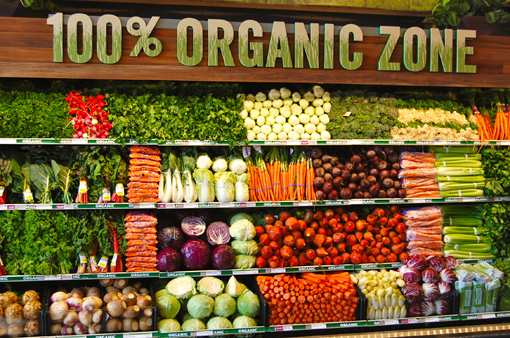Nowadays, it seems like the food system is heavily industrialized, and the farm-to-fork system is a hazy dream that was only reality decades ago. Food is processed, genetically modified, and travels far distances to make it to your plate. The consequences of these conventional methods are more often than not harmful to workers, animals, the environment, and even consumers.
Yeah, it’s kinda scary.

Gif courtesy of doseoffunny.com
We’re part of the 20 million+ students at colleges around the country — as a collective, we play a huge part in the food system. Most campus dining is managed by food management companies that purchase from conventional food sources. This means that billions of dollars from colleges alone are put into supporting the conventional, industrial food system every year.

Gif courtesy of giphy.com
So how do we fix this problem and put our money where it really matters? Well, the Real Food Challenge (RFC), launched in 2008, works to do exactly that. It is a rising movement at college campuses all across the country. The goal of the challenge is to get universities to buy food that is better for its consumers, the environment, and the workers. Instead of using purchasing power for conventionally-sourced foods, the RFC challenges universities to buy “real” food.
“Real” food, as defined by the RFC just has to meet four standards: It’s local, humane, fair, and ecologically sound. Let’s break that down:
Local

Photo courtesy of lakeworthfarmersmarket.com
Local food originates from 150 miles from where it is being served. It’s easy to get local foods for yourself from the farmers’ market, or sometimes even in supermarkets. Because the food travels such a smaller distance from the farm to you, eating locally reduces carbon emissions from transportation; it’s also fresher and supports local business.
Humane

Photo courtesy of farm4.static.flickr.com
Food is humane when livestock animals are treated properly when they are being raised. Conventional livestock is usually raised in a concentrated animal feeding operation (CAFO), where they’re forced into cramped spaces and often fed a diet that is not natural to their system. Cows are kept from grazing grassy areas and instead are fed corn, which is a highly unnatural diet and causes severe stomach problems. No wonder the Chick-fil-A cow wants you to “eat mor chikin.”
Fair

Photo courtesy of socialearth.org
If food is fair, it means that everyone along the food production and service chain is being paid a fair and living wage and treated properly so that they can sustain their own and their families’ lives. Workers in the system include farmers, farmworkers, and food service workers like waiters, cooks, and servers. The list of nine principles from the Fair Trade Federation, a fair trade-certifying organization, outlines the ideas behind what “fair” signifies really well.
Ecologically Sound

Photo courtesy of blog.kulikulifoods.com
Ecologically sound food is environmentally sustainable and not harmful to the natural environment. Oftentimes, this means no pesticides, unnatural fertilizers, or GMOs. Additionally, it means buying fish and meats that are sustainable. The Monterey Seafood Watch program divides fish into three different categories based on whether they are sustainable to fish in accordance to marine population levels.
In essence, the organization stresses that real food “truly nourishes produces, consumers, communities, and the earth.” These are the larger components of a food system, from the chicken in the coop to the dining hall worker at your campus. It can be broken down like this:

Photo courtesy of wholly-nourished.com
Many universities have already signed the Real Food Commitment. This means that they pledge to have at least 20% of their food to come from “real” sources by 2020. If 20% of food at all universities in the United States were real by 2020, over 1 billion dollars of spending would be shifted from conventional and industrial food sources towards real food sources.
Shifting to purchasing real food at college campuses is no easy feat, but it makes a huge difference in the food system of our country — it all starts with students just like us. Real Food Challenge campaigns are student-started initiatives and can lead to additional student involvement on campus, like with a food systems working group and calculator interns. The best part is, it creates a real change: every year, new universities are signing on to shift their purchasing power for food that is truly better for everyone involved in the food system.


